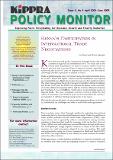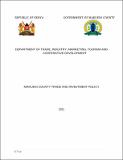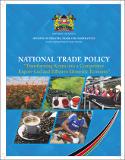| dc.description.abstract | The African Continental Free Trade Area (AfCFTA) has experienced substantial growth, prompting the exploration of the key factors driving this expansion. In response to this dynamic landscape, this study seeks to provide insights to policy makers, specifically focusing on how Kenya can strategically position itself to maximize the benefits within the AfCFTA framework. To achieve this, the study used the bilateral gravity model to examine how Kenya could capitalize on the opportunities presented by the AfCFTA. A Feasible Generalized Least Squares (FGLS) approach was used, using panel data spanning 22 years to model the impact of macroeconomic conditions, trade facilitation, and institutional stability within partner states on Kenya's export performance across 48 economies. The study findings reveal the pivotal factors influencing Kenya's exports, with per capita GDP in the destination country emerging as a significant contributor to export growth. Simultaneously, challenges such as transportation costs between member countries, time taken for customs clearance, and document requirements for one to export have a negative influence on Kenyan exports. Notably, the study finds that institutional stability provides a favourable environment for Kenya’s products within the AfCFTA. To expand Kenya’s trade in Africa, firstly, there is a need to promote Kenya’s industrialization by investing in the advancement of the industrial sectors, enhancing product competitiveness, and tapping into new markets, thus contributing to the realization of the African Union (AU) Vision 2063. Additionally, the study underscores the importance of harmonizing trade procedures and policies to streamline and facilitate cross-border trade. Furthermore, the study recommends fast-tracking the implementation of the Kenya Export Strategy by fostering public-private collaborations, investing in infrastructure, and providing targeted support to export-oriented industries to enhance Kenya's share of exports within the African continent. Lastly, it is imperative to champion the AfCFTA partner states to implement a sound institutional framework to facilitate transparency, economic growth, and security to boost intra-African trade. | en |




